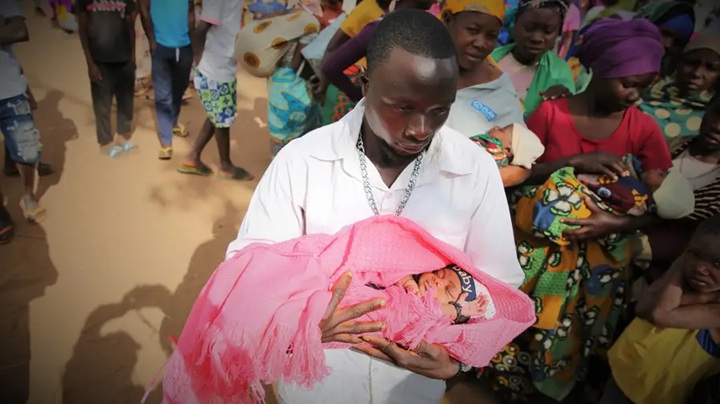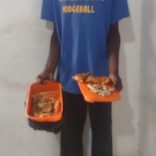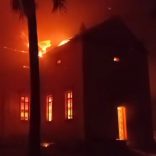Mozambique: Son arrested for trying to deliver cannabis-filled samosas to father in prison
Mozambique: 15-day-old Neusa in night-time terror escape

Photo: Lusa
Baby Neusa was born on July 13 in the village of Chiúre Velho, from where she fled through the forest, a babe-in-arms wrapped in a pink blanket, when her family sought safety after another terror attack.
Agostinho, Neusa’s father, explains what it was like to trek 50 km through the forests of Cabo Delgado again, and says he’s still afraid.
“She’s not even a month old yet,” he explains to Lusa. “It was because of the situation. Al Shabab [Ahlu-Sunnah wal Jama`a – ASWJ],” he explains, in faltering Portuguese.
This is his second escape in just over a year, and it took him and his family eventually to the playground of the Coqueiros Primary School (EPC), in the town headquarters of Chiúre district.
“I am scared, yes,” says Agostinho, a 27-year-old farmer, recalling that he had already been forced to make the same trek with two children and his wife in March 2024, after the first attack on the village, where he had depended until now on sesame seeds grown in his machamba.
“This is the second time I’ve fled. I don’t want to go back there,” he says, adjusting Neusa’s little hat, before confidently asserting: “I’ll settle down somewhere else.”
Elements associated with the extremist group Islamic State have claimed responsibility for the attack on Chiúre Velho village and police station in southern Cabo Delgado province, on Thursday.
The claim is documented in a video in which the rebels, allegedly belonging to the Ahlu-Sunnah wal Jama`a (ASWJ) group, appear firing bursts of machine gun fire and entering the police station. They claim to have taken material, burnt a vehicle and “freed Muslim prisoners”. At least one person was beheaded in the town centre.
READ: Mozambique: Food, aid arrives for thousands fleeing Chiúre
Mozambique: Over 26,000 displaced last week in Cabo Delgado – IOM
Rosário Aly, 50, also a farmer from Chiúre Velho, arrived at the Coqueiros EPC on Saturday. In just over a year, this is his third escape on foot with his family – a wife and five children.
“I’ve fled here three times. This is the third time,” he confesses, in reference to previous escapes on foot in March and June 2024.
When neighbours signalled that insurgents were approaching, everyone left with only the clothes on their backs. “Those with money fled on motorcycles. Those of us without money fled on foot,” he says.
He doesn’t know what returning home will be like after the terrorists’ passage, but is certain of returning: “Yes, because our land is right there. That’s where we grow cassava.”
READ: Mozambique: Pedro, seeking the family of the boy he fled with
Officially, agencies on the ground have so far counted more than 34,000 newly displaced people between July 20th and 25th alone, due to new insurgent attacks in the districts of Chiúre, Ancuabe, and Muidumbe.
In Chiúre alone, the wave of displaced people that has been growing since Thursday has reached, according to field estimates, 3,500 families, spread across family homes, but mainly through two temporary centres in two schools in the town, which are closed this week.
The Coqueiros EPC is home to more than 1,900 families, who began receiving humanitarian aid from United Nations agencies on Tuesday, in the same playground where women cook improvised meals and hundreds of children play almost normally, in a school without classes.
Gas-rich northern province of Cabo Delgado has been facing an armed rebellion since 2017, resulting in thousands of deaths and a humanitarian crisis, with more than a million people displaced.
At least 349 people died in attacks by Islamic extremist groups in northern Mozambique in 2024, a 36% increase compared to the previous year, according to a study released in February by the Africa Center for Strategic Studies (ACSS).
According to ACSS, which studies security issues in Africa, this “recovery in violence levels” in Mozambique “reflects the strategy” of the ASWJ group – an IS affiliate operating in Cabo Delgado province – of “expanding the conflict by moving inland and into more rural areas”.
CABO DELGADO IS BLEEDING — AND THE WORLD CONTINUES TO LOOK AWAY
On 28 July 2025, just two days ago, thousands of families were once again forced to flee their homes in Cabo Delgado, northern Mozambique. Entire communities left everything behind — running for their lives,… pic.twitter.com/os1N0zaAaq
— Prof. Adriano Nuvunga (@adriano_nuvunga) July 30, 2025












Leave a Reply
Be the First to Comment!
You must be logged in to post a comment.
You must be logged in to post a comment.